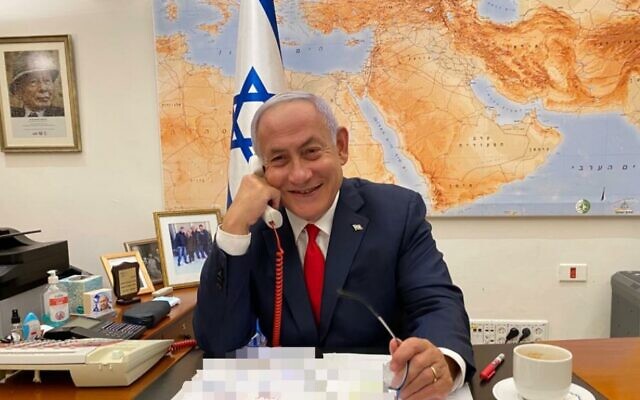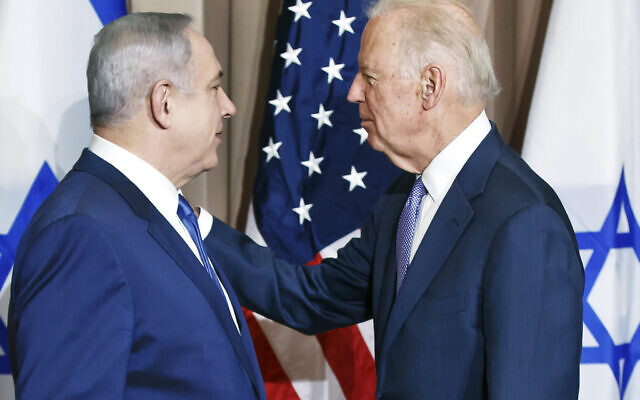White House: Biden vowed to boost defense ties, stressed need for peace with Palestinians, region; PMO: They discussed building on normalization deals, Iran nuclear threat, COVID
By JACOB MAGID, TOI 7 February 2021,

Prime Minister Benjamin Netanyahu speaks to US President Joe Biden on February 17, 2021. (Prime Minister’s Office)
Prime Minister Benjamin Netanyahu spoke on the phone with US President Joe Biden Tuesday for the first time since the president took office four weeks ago.
Netanyahu was the first Middle Eastern leader to receive a call from Biden, but the 12th world leader overall. The long weeks of silence since Biden took office had led many to wonder whether the White House was snubbing its longtime ally, given Netanyahu’s frosty relationship with former Democratic president Barack Obama and his overwhelmingly warm ties with the more recent Donald Trump.
The conversation was “very friendly and warm and lasted about an hour,” the Prime Minister’s Office said.
The White House did not immediately comment on the call. Asked about the call by reporters in the Oval Office, Biden said it was a “good conversation” without elaborating further.
A later White House readout said Biden “affirmed his personal history of steadfast commitment to Israel’s security and conveyed his intent to strengthen all aspects of the U.S.-Israel partnership, including our strong defense cooperation.”
The two leaders discussed further strengthening US-Israeli ties in addition to building on the normalization agreements that were brokered by the Trump administration between Israel and its Arab neighbors, the PMO said. They also spoke about “the Iranian threat and challenges of the region, agreeing to continue talks between them.”
Also during Tuesday’s call, Netanyahu and Biden discussed the ongoing coronavirus pandemic and the US president lauded the Israeli premier over Jerusalem’s world-leading vaccine effort.
The White House readout made no mention of the pandemic, but it did state that Biden “underscored the importance of working to advance peace throughout the region, including between Israelis and Palestinians. The PMO readout made no mention of the Palestinians.
Biden has said he intends to re-enter the 2015 Joint Comprehensive Plan of Action (JCPOA) with Iran, setting him and Netanyahu on a potential collision course. Netanyahu strongly opposed the deal when it was made, and hailed Trump’s decision to quit it in 2018.

Israeli Prime Minister Benjamin Netanyahu, left, and then-US Vice President Joe Biden speak prior to a meeting on the sidelines of the World Economic Forum in Davos, Switzerland, Thursday, Jan. 21, 2016. (AP/Michel Euler)
The US president said last week that his administration would not agree to lift sanctions on Iran before it halts its increased uranium enrichment, saying that the Islamic Republic will have to first resume full compliance with the nuclear deal. Iran has demanded Washington first return to the deal and remove sanctions.
Biden has also said wants to address Iran’s ballistic missile program and regional hegemony, but that the priority is first getting Iran to comply with the JCPOA. Iran rejects any such negotiations. Israel maintains that these issues cannot wait and that the US will lose its leverage with Iran if it returns to the nuclear deal without demanding more in return.
The prospect of the US reengaging with Tehran has drawn warnings and alarm from Netanyahu and his allies.
Netanyahu, who publicly lobbied against the 2015 deal, has warned Biden that it would be a “mistake” and “folly” for the US to rejoin the JCPOA.
In a Monday television interview, Netanyahu vowed to counter those who oppose his hawkish stance toward Iran when asked about the lack of call from Biden.
Netanyahu told Channel 12 he has “wonderful ties” with Democrats in Congress, after forging a close bond with Trump and feuding with Obama over the terms of the 2015 accord limiting Iran’s nuclear program in exchange for sanctions relief.
Netanyahu said ties with US lawmakers were “a question of policy” and not partisan affiliation.
“Whoever supports our policies, I’m with him. And whoever endangers us, for example [on policies] regarding a nuclear Iran, which is an existential threat to us, so I oppose that, and I don’t care if it’s Democrats.”



@ Davidowitz:
Neither.
One certainty; it’s not going to be a goy in Washington, but a Jew in Jerusalem that’s going to determine the destiny of the Jewish nation in the land of Israel.
Nancy pelosi is a she-devil and a dirty old twat. Kamala harris is a whore who fucked her way to the top.